 | Creative Writing Projects |  |
 | Creative Writing Projects |  |
|
Try one of these creative writing projects to spice up your study of
the nervous system. If you would like to share
your work on the Neuroscience for Kids pages,
send it to me through e-mail (chudler@u.washington.edu) or
by regular mail to:
Dr. Eric H. Chudler |

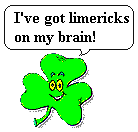
Try your hand at a witty (or not so witty) "limerick." You know, those
bouncy little poems that rhyme. Here are a few examples: | ||||||
|
The brain uses neurons to think, To know, to remember, to drink, Without them you'll find, You'll be in a bind, Your body will fail and sink. |
A neuron was once in the rain, It said "This is really a pain", It said to its friend, "This must really end", So a message was sent to the brain. |
|
The thalamus is a grand station, It gives and receives information, Gets messages here, Sends messages there, It's quite an important location. |
The brain is important, that's true, For all things a person will do, From reading to writing, To skiing to biting, It makes up the person who's you.
|
| It's a fortunate person whose brain Is trained early, again and again, And who continues to use it To be sure not to lose it, So the brain, in old age, may not wane.
- This last limerick was written by M.R. Rosenzweig and E.L. Bennett, | |
Example poems (including limericks) from the 2002, 2004, 2008, 2010, 2012, 2014, 2016, 2018, 2020, 2022,and 2024 Neuroscience for Kids Poetry Contests.


Unlike limericks, poems do not have to rhyme. Take these two examples: | ||||||||
| Bad Poem | Good Poem |
| Roses are red, Violets are blue, I have a brain, It's a really nice thing to have.  by The Unknown Poet by The Unknown Poet
|
The Brain-is wider than the Sky- For-put them side by side- The one the other will contain With ease-and You-beside.  by Emily Dickinson by Emily Dickinson
|
| You don't have to be a famous poet like Emily Dickinson to write poetry. However, I think you can do better than the Unknown Poet. Give it a try! | Here is one sent in by a student (R.T.):
A runn'n train, Without it you Will go insane, It wiggles and Works, thinks And learns, Who has the smartest brain, All the people that have a name. |
Here is poem sent in by 7th grader, Taylor R.:
A stimulus occurs when the environment starts changing,
A fly goes by my eye and I automatically blink. |


Pretend your brain was going on an interview for a particular job. Why
would your brain be best for the position? What parts of your brain are
best for the job? Develop a resume (a summary of qualifications,
experience and education) for your brain. You may want to pick an
occupation. For example, why is your brain best suited for a teacher?
Why is your brain best suited for a basketball player?
|


You've got a brain...now let everyone else know that they have one too.
Create a bumper sticker with your own "brainy" saying. Here is an
example: |

Fill in speech bubbles to create your own brainy comics. Click on any
picture to print it out or download all three comics on single page (PDF
file). You can also draw you own pictures and make your own comics. |


See have far you can twist a tongue by creating a "tongue twister." For
example, try saying the following sentences: |

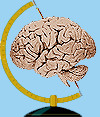
Someone wants to take a trip to your brain. What will they find there?
What does each part do? What can people do at each "location?" Write a
travel guide for your brain explaining what someone can see and do when
they visit your brain.
|

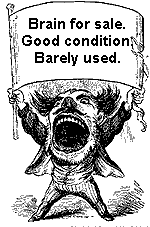
Your brain is now for sale. Create an advertisement for your brain. The
ad could be a short paragraph for the Sunday classified section or a full
page ad with bright pictures and words. Describe what the buyer will get
when they buy your brain. Perhaps add some comments from the previous
owner. What makes your brain better than others? How much
education has your brain had? Perhaps give a bit of your brain's history
like: |


Create and publish your own newspaper, complete with a name, headlines and
stories about a day in the life of your brain. For example, you could
call your newspaper "The Daily Dendrite" or "The Brain Bulletin".
Stories might include: |

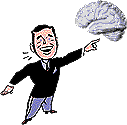
Information about the brain is easy to find. Newspapers and magazines
often have articles about the nervous system. TV and radio stations
often run stories about the brain and new treatments for neurological
disorders. Advertisers even use the brain to sell
products. |


What are the top ten things you like about your brain? What are the most
interesting things you have learned about the brain? What are the
best ways to protect your brain and keep your brain healthy? Make a list
of them and display them on a poster. Need some ideas? Here are some
examples of these TOP TEN LISTS.
|

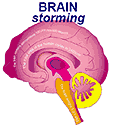
Here is another poster idea. Sure, Brain Awareness Week
is in March, but it really can be any time you are studying the nervous
system. Make a poster that celebrates the most important organ in your
body...THE BRAIN. |

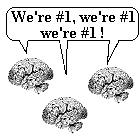
What is your favorite part of the brain? Not the
most important part, but your favorite part. What do you like about it?
What does
it do that you like? Be as specific as possible about the area of the
brain you choose. Read about different parts of the brain at divisions of
the nervous system.
|


What will the brain of the future be like? Which parts of the brain will
continue to evolve? Which parts will get bigger, which parts will get
smaller. Will the brain grow? What will this do to the rest of the body?
Will computers
"interface" directly with the brain?
|


Keep a journal that records all of the sounds that you hear in one day.
Record ALL of the sounds that you hear, even those that do not seem very
important. How many different sounds did you hear? How did these sounds
make you feel? Compare your journal with those of
other students. Did you hear similar sounds?
|


Start a drug abuse awareness campaign. Begin by creating a poster that
tells about the dangers of taking illegal drugs. Think of a catchy slogan
like the famous: |


Become a composer and create your own "Brain Song". Either create your
own music or change the words to a popular song with a melody that most
people know. There are some examples on the Brain Song Page.
|


A mnemonic device is one way to help you remember. One type of mnemonic
is called an "acrostic." An acrostic is a phrase that uses the first
letters of words to remember the entire phrase. For example, the
phrase: |


Ok, ok. If you still insist on doing a "regular" research report, you can
do a "regular" research report. Need some ideas and a lesson plan for
your report? |


Your brain...the most important 3 pounds in your body...so PROTECT IT! |


Here is your chance to watch a movie and learn something about the brain
at the same time. Your assignment is to watch a movie about the brain
(Awakenings, Charly, Rain Man, Regarding
Henry, The Wild Child) and then write a short report. |
| Complete Movie Lesson Page |

Increase your vocabulary as you solve this puzzle with words that rhyme
with "brain." |

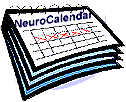
FOUR weeks of activities to keep you busy. These
are short projects to get you thinking about the brain.
|

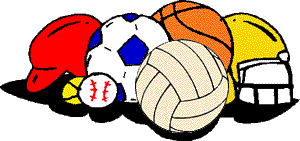
If you belong to a team or a club, you need a name.
Why not choose a "brainy" name? How about "The Maple Street Myelin" or
the "Golden Ganglia?" My personal favorite is "The Axonal Aces." You
could even name your team after your city: The Nantucket Neurons, The
Denver Dendrites, and of course, The Boston Brains. Use your brain
to name your team. |


Choose an organization that supports brain research or an advocacy group
devoted to neurological or mental illness. Write a letter to this group
explaining your concerns and feelings. You may even ask them to send you
additional information on a particular topic.
|


Choose a famous neuroscientist and write a thank you letter to
show how much you appreciate his or her discovery and contribution to
brain research. |

Can you think of a 26 different nervous system words or concepts each
beginning with a different letter of the alphabet? Make this list and add
the definition of each word. |

Answer these questions as you learn about the brain:
|
| BACK TO: | Experiments and Activities | Table of Contents |
![[email]](./gif/menue.gif) Send E-mail |
 Get Newsletter |
 Search Pages |